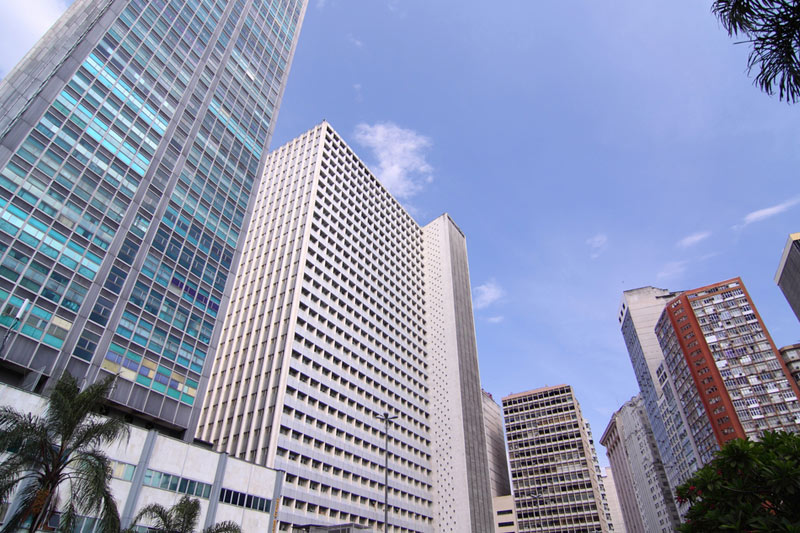By Walter Brandimarte RIO DE JANEIRO (Reuters) - Brazil's sluggish economy faces substantial risk of falling into a light recession in 2014, and may already have done so, providing opposition candidates with extra ammunition in the run-up to October's presidential election.
Latin America's largest economy has slowed to average growth of just 2 percent a year since President Dilma Rousseff took office in early 2011 and, coincidentally, global demand for commodities ebbed.
Attempts to boost activity by spurring consumption largely backfired as investment failed to catch up with demand, driving inflation higher and eventually forcing the central bank to drive up interest rates.
The economy has stagnated over the past 12 months and industrial output fell for three straight months through May.
Now, some economists say the economy likely shrank between April and June and that growth in the previous quarter could be revised into negative territory from its previously reported 0.2 percent gain.
"That would give you a technical recession," warned Alberto Ramos, Goldman Sachs senior economist for Latin America. "It wouldn't be a deep one, but it would have a relevant political cost."
If the numbers do come in negative when gross domestic product data is released on Aug. 29, it would be more than just another sign that once-booming Brazil remains stuck in an economic rut - it would allow opposition candidates to use the "R-word" for five weeks before Brazilians vote on Oct. 5.
Rousseff currently leads the presidential race with 38 percent of voters' support, according to the latest opinion poll. Aecio Neves, her main opponent with 20 percent support, has criticized Rousseff's inability to bring inflation under control and says her interventionist policies have failed to foster economic growth.
Both Neves and Eduardo Campos, who is running third in the presidential race, have promised to cut taxes and restore investor confidence with a pro-business agenda, including changes in state-run oil company Petróleo Brasileiro SA, whose financial performance has suffered because of a government policy forcing it to sell fuel at below-market prices.
While it's unclear whether Brazil's hosting of the World Cup soccer tournament will have any lasting impact - positive or negative - on Rousseff's popularity, her re-election chances are much more dependent on Brazil's economic success.
And that's where the opposition might have a chance.
Brazil's second-quarter gross domestic product, as well as any potential revision to previous figures, will be released on Aug. 29, but there are widespread signs of economic trouble.
Consumer confidence in the city of São Paulo, Brazil's biggest city and business capital, dropped in June to its lowest level in nearly 11 years, hurt by a combination of stubborn inflation, smaller wage increases and higher interest rates that have eroded Brazilians' purchasing power.
Slowing economic activity caused government revenues to fall more than expected in May, resulting in the second-largest monthly primary budget deficit ever. That means Brazil did not have enough revenue in May to cover all of its expenses, including interest obligations.
Retail sales are also forecast to dip for a third straight month, according to a Reuters survey..
JOB MARKET ALSO COOLING
Even Brazil's tight job market, one of Rousseff's main calling cards on the campaign trail, has started to falter. The pace of job creation in May was the worst for that month in 22 years as a net 30,000 industry workers lost jobs.
Take the labor-intensive automotive sector as an example. Car sales are forecast to drop more than 5 percent this year while truck sales, which move hand-in-hand with investment decisions, are expected to plunge 14 percent, according to industry associations Anfavea and Fenabrave.
"We're not expecting an improvement any time this year," said Roberto Cortes, president of German truck maker MAN in Brazil.
"You only buy a truck if you expect to transport more merchandise. And all growth indicators, either in the agricultural or the industrial sectors, are not growing or growing so little that it isn't worth increasing your truck fleet."
"Economic activity as a whole is very low, especially in the industrial sector, which is suffering the most."
Sales of corrugated board, used for all sorts of packaging and considered a gauge of overall economic activity, fell year-on-year in each of the last three months.
Recession fears have been around since the second half of last year, the direct result of a long central bank anti-inflation campaign that has lifted borrowing costs by 375 basis points since April 2013 to 11 percent.

"Effectively, the Brazilian economy has already been stagnant since the middle of 2013," said Bill Adams, senior economist with PNC group in New York. "The odds are that Brazil will see a technical recession at some point in 2014."
(Editing by Todd Benson and Kieran Murray)
